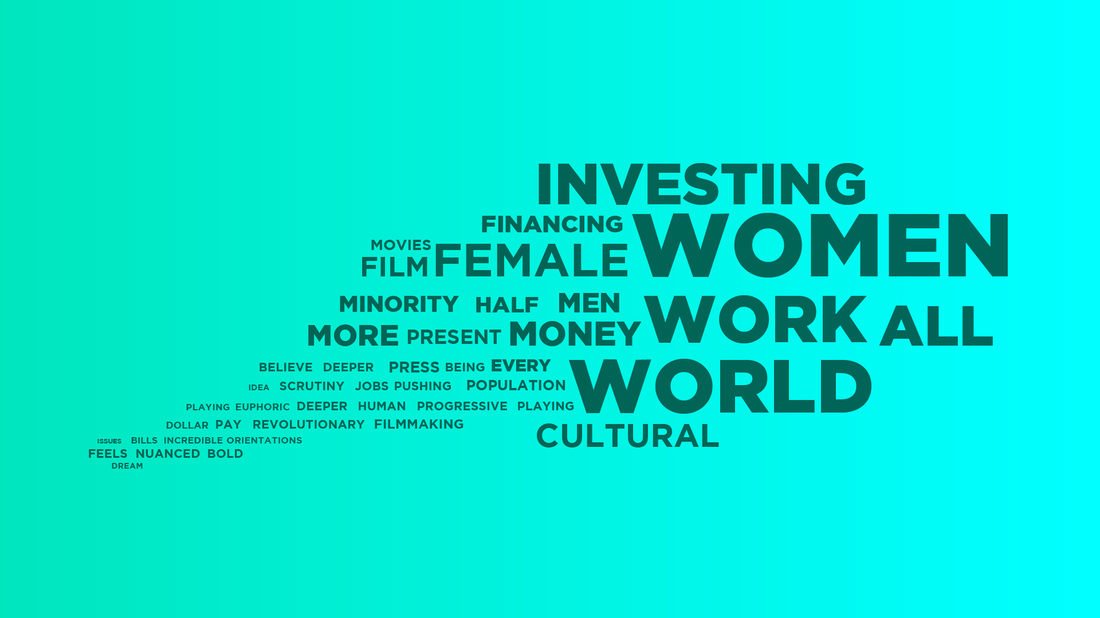|
Gender inequality in Hollywood is on everyone’s mind in the industry – and with good reason. Even the Equal Opportunity Employment Commission has launched an investigation into gender bias in Hollywood. We wanted to hear more from women independent filmmakers: Have they been impacted by discrimination? How do we fix it? According to a cross section of women we interviewed from around the country, the solution lies in dollars and sense. Vera Miao, a filmmaker born to working class immigrants from Taiwan and one of the filmmakers chosen for THROUGH HER LENS: The Tribeca Chanel Women's Filmmaker Program’s inaugural year says: "Money, financing, that’s the gatekeeper. All the issues we talk about in filmmaking, it almost all comes back to financing." Simply put, you need money to make a film. Miao, goes on to say: "It wouldn’t matter what men thought of women broadly or generally if women controlled money." Money Matters So, how do women get more control over the money? One way is by applying for grants like those Tribeca Film Institute (TFI) offers. All of the women quoted in this article have at some point been either awarded funding from TFI or participated in a TFI development program to help them build resources. Angela Tucker, a Tribeca All Access® Alumni grantee for the documentary web series Black Folk Don’t and a New Yorker born and raised, drives the point home: “You do need to work with someone who is going to pay you. I would like to be able to continue to do work as I do and find a space where I can be a little more financially supported. That’s the dream.” Having resources, money, and an amazing story can yield an independent film that reaches and inspires mass audiences, and it’s the reality any filmmaker desires. Ideally further directing opportunities follow, but it isn’t always so simple. As Crystal Moselle, a New-York-based director of the TFI-supported hit documentary film The Wolfpack reveals: “Often I get called for commercial jobs that are looking for a female director. It’s incredible that it’s not about the work it’s about your gender.” Even after a well-received film puts a female director on the map, the industry often takes more notice of her gender than the filming style or genre that got her in the door. A woman director is still thought of by many in the industry as an anomaly – something to be sought out. Maybe they’re feeling the pressure of being politically correct or they suppose a film can need a woman director full stop, as if all women have the same vision. Either way, with this thought persisting among film financiers, funding a ‘female-directed’ film appears to be a radical thing to do. Paola Mendoza, a Tribeca All Access® grantee for Entre Nos, born in Bogotá, Colombia, reveals why putting dollars behind women filmmakers is just common sense: “I would eliminate the idea that investing money in women is revolutionary, or bold or progressive. The investment of dollar bills should be the norm, as we are half the population. If investing in women was as commonplace as investing in men, I strongly believe the playing field would be much more equal.” Widening the Lens: From Her Point of View Investing money in a small subset of the entertainment community because of bias against half the population hugely limits the lens through which we’re all viewing our world. What would happen if we widened that lens and got a look at the bigger picture? Anna Martemucci, the recipient of production funds for the inauguralTHROUGH HER LENS: The Tribeca Chanel Women’s Filmmaker Program, believes it would be an eye opener: "If the numbers changed to reflect the actual world (a world of people of many ethnicities, sexual orientations, and one comprised of half women) it would create a deeper, more nuanced cultural understanding of what it is to be a human. And that, to me, is what movies are all about." Occasionally a film that breaks the historically-favored mold of the heterosexual white male point of view reaches a large audience, but it’s rare, and because of that it becomes precious. Roja Gashtili, who along with her producing partner Julia Lerman was aTHROUGH HER LENS alum, explores the unfair pressure this often puts on any film telling a previously sidelined narrative: "I watch (and judge) minority or female stories with such scrutiny because it often feels that we only get the one each year so it better be amazing, but imagine a world where a minority-led show did not have to be everything for every minority but could stand as just that person's view of the world, take it or leave it." Filmmaking: The Ultimate Satisfaction As many trials as women face in filmmaking, it’s the challenge of being on set itself that lights them up and keeps them going. Deb Shoval, who divides her time between New York City and rural Pennsylvania and is an IWC Filmmaker Award recipient for AWOL, shares her love of filmmaking: "Being on set is addictive and euphoric because it forces us to be present at every moment." Moselle confesses that filmmaking gives her the ultimate sense of fulfillment: "I’d much rather be on set doing what I love, than walking a press line." At the end of the day, by investing in all kinds of filmmakers from all diverse walks of life, entertainment will become more interesting, audiences will respond, and we all have the opportunity to be more empathetic. Everyone stands to gain. By, Lillian Isabella (Originally posted on Tribeca Film Institute's Blog)
1 Comment
|
AuthorI am an advocate for gender parity in the entertainment world and write, act, and produce with a mind to facilitate that change. Archives
February 2017
Categories
All
|

 RSS Feed
RSS Feed